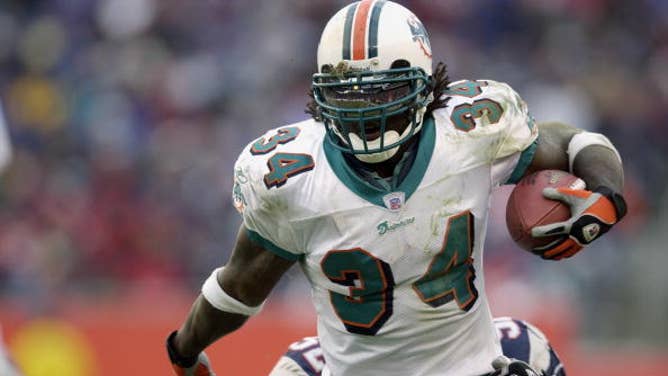Ricky Williams Says 'At Least 80 Percent Of NFL Players Smoke Weed' (And We Think He Might Be Low)
In 2002, the Miami Dolphins risked their entire future on running back Ricky Williams, trading two first-round draft picks and more to the New Orleans Saints. They hoped he would become the face of the franchise and a workhorse on offense.
And he was - for a little while. A Heisman Trophy winner at Texas, the running back went on to become an All-Pro and the 2002 NFL Rushing Yards Leader. Miami faithful screamed “Run Ricky Run!” from the rooftops, hoping they had found the shining beacon who would return their team to relevance in a post-Dan Marino era.

Miami Dolphins' Ricky Williams was the 2022 NFL Rushing Leader. (Photo by Ezra Shaw/Getty Images)
And then, at 27 years old, Williams retired. Not because he was injured or needed more time with his family or didn’t like football anymore. This man quit his multi-million-dollar NFL running back job because they just wouldn’t let him smoke weed.
After multiple failed marijuana tests (and a weird hiatus where he escaped to the Sierra foothills to study yoga and ancient Indian medicine), he found his path.
“I probably would have played longer,” Williams told The New York Post. “But I also probably wouldn’t have had as much of an impact. It wasn’t until I had life experiences, got in trouble and started learning who I really was that my life felt meaningful.”
No Regrets
Now 45, Williams has dedicated his life to the devil’s lettuce. Just last year, the former Texas Longhorn launched his own cannabis company, called Highsman, with the goal of combining his two passions: sports and weed.
Highsman sells bud in five states and touts three strains of flower, all with football-themed names: Pregame (sativa), Postgame (indica) and Halftime (hybrid). They also organize events, including the "Highsman House" smoke sessions and watch parties for Monday Night Football.
Ironic, given his history with weed and the NFL.
“These days, at least 80 percent of NFL players smoke weed,” Williams guessed. “I don’t think they’re smoking before games – I think there might be one or two guys on the team. But especially this day and age, it’s everywhere, it’s so easy. My opinion, if you’re in the NFL, why wouldn’t you?”
Well, probably because it can get you suspended.
In 2022, marijuana is medically legal in 39 states and recreationally in 21. Given its anti-inflammatory and neuroplasticity benefits, many folks have advocated for the use of THC to help athletes recover from injury and relieve pain.
Still, the NFL has often treated positive THC tests more harshly than domestic violence, DUIs and other heinous offenses. Players like Josh Gordon and Martavis Bryant have famously had their careers derailed just for smoking pot.
The NFL Has A Drug Problem, But It Isn’t Weed
A study conducted by Washington University found that 52 percent of retired players said they used prescription pain medication during their playing days.
Hall of Fame QB Brett Favre once told CBS Sports he took 15 Vicodins at one time or about “a month’s worth of painkillers in two days.”
I’m no doctor, but routinely popping a bottle of pills feels like it might have way more negative long-term effects than rolling up a joint.
Maybe that’s why so many former athletes are hopping on the cannabis wagon. With his Highsman brand, Williams joins a growing list of other retired athletes who have started their own business selling hemp-derived products, including Mike Tyson (Tyson Holistic Holdings), Joe Montana (Liquid 2 Ventures) and Marshawn Lynch (Dodi Blunts).
The NFL is, however, making some strides. Under the new Collective Bargaining Agreement, players will not be tested for THC-carboxylic acid, the chemical found in marijuana, from April 20 to August 9.
Just 20 years too late for Ricky Williams.